Meta-analysis of Studies Investigating Association between FTO Gene Polymorphisms and Breast Cancer
Download
Abstract
Back Objectives: The aim of this study is to pool the result of studies on the association between FTO gene polymorphisms and breast cancer (BC).
Material and Methods: We searched PubMed, Embase, Science Direct, Scopus, web of science, and Cochran to identify studies investigating the associations between the rs1477196 and rs9939609 polymorphisms and BC risk. We pooled adjusted odds ratios (ORs) as overall. ORs were estimated using a random effects model.
Results: In total, 16 articles were included in the final analysis. Considering the dominant model of inheritance, there was an inverse association between the rs1477196 polymorphism and BC (OR 0.76 [0.64- 0.91]). There was not observable heterogeneity (I2: 0.0%, P=.867), but with a small study effect (b=1.19, P=.03) in this analysis. Moreover, there was not any association between the rs9939609 polymorphism and BC (OR 0.98 [0.79- 1.2]). There was not observable heterogeneity (I2: 23.1%, P=.27) and small study effect (b=-3.817, P=.303) in this analysis.
Conclusions: The carriers of rs1477196 polymorphism of FTO are at lower risk for BC. Carriers of Rs9939609 polymorphism had no association with Breast cancer risk.
Introduction
Obesity increases the risk of breast cancer by 30-50% in women after menopause [1]. In a 16-year cohort study on 900,000 healthy people, obesity caused 57,000 cancer related deaths. Additionally, it has been shown that the death rate from cancer in persons with the highest BMI was twice that of women with the lowest BMI [2]. Genetic, behavioral and environmental factors are among the most important factors associated with both obesity and breast cancer [3]. There are a variety of mechanisms for linking obesity and cancer risk. Obesity increases insulin resistance, and hyperinsulinemia increases the secretion of the growth hormone, which in turn stimulates the production of carcinogens, mitogenesis, and triggers routs to oxidative stress and inflammatory process [4]. Several genes have also been studied with regard to the association between obesity and cancer; the most scientifically plausible one is FTO (fat mass and obesity-related). The association between FTO and obesity and cancer has been confirmed through the presence of single-nucleotide polymorphisms (SNPs). There are several SNPs in the FTO gene that recent studies have shown an etiologic role in incidence of breast cancer. Some of these polymorphisms include: rs9939609, rs17817449, rs8050136, rs1477196, rs6499640, rs16953002, rs11075995, and rs1121980 [5-6]. This systematic review and meta-analysis aims to 1) identify all FTO gene polymorphisms involved in the risk of breast cancer or prognosis of breast cancer, and 2) to pool the studies that report a quantitative measure of association between a FTO polymorphism and breast cancer risk and progression.
Materials and Methods
Search Databses and Strategy
In the current study, all of the published articles related to FTO gene polymorphisms and breast cancer until 20 January, 2019 were searched in the Pubmed, embase, Science Direct, Scopus, web of science, and Cochran databases. Key words such as “fat mass and obesity associated gene” and/or “FTO”, “breast cancer” and/or “breast neoplasm” and/or “polymorphism” and/or “SNP” were used in order to obtain the related articles. All articles collected in the electronic search process as well as the references used in these articles were reviewed. Irrelevant, non-English, and inappropriate articles were excluded from systematic review process based on the following inclusion and exclusion criteria.
Inclusion and exclusion criteria
Studies which have quantitatively investigated the association between FTO gene polymorphisms and breast cancer using case-control studies and odds ratio and confidence interval indicators. Studies focused on the other cases as well as those which had investigated outcomes other than breast cancer (e.g., obesity or other cancers), and studies which had investigated breast cancer in men were excluded from our review study.
Assessment of methodological rigor
At this stage, studies conducted to investigate the association between FTO gene polymorphisms and breast cancer were selected. The quality of studies was independently assessed by 2 persons (SD and MGh), and if two assessors do not agree with each other, the assessment was completed as a discussion with a third person (SAMJ). The irrelevant articles were excluded from the intended articles. The full text of the articles known as appropriate in this study was investigated. In order to assess the quality of the studies’ methodology, the standardized quality assessment method for clinical trials (The EPOC Risk of Bias Tool) was used [7]. In addition, the preferred reporting items for systematic reviews and meta-analyses (PRISMA) were used in this study [8]. Figure 1 shows the selection process of the studies used in the current study and the studies excluded from this study in the order of their removal reasons. According to PRISMA guideline, we entered the intended data into the study and used pilot forms to collect the data required by these studies. All data related to participants, interventions performed, comparisons, outcomes, and studies design were (PICOS) gathered.
Figure 1: Forest Plot of the Association between rs1477196 Polymorphism and Breast Cancer.
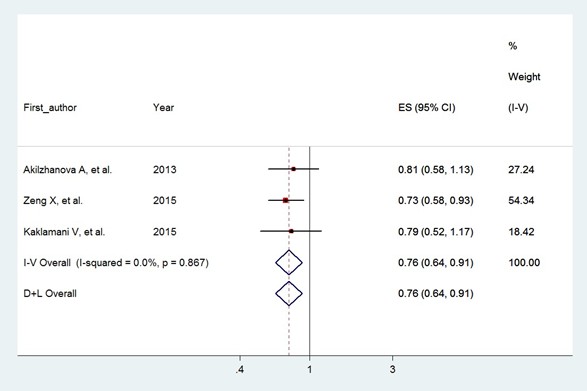
Results
Systematic Reviews
The Search Strategy
The following search strategy was used to search the databases:
(rs17817449 OR rs8050136 OR rs6499640 OR rs16953002 OR rs11075995 OR rs1121980 OR FTO gene polymorphism) AND (breast cancer OR Breast Tumor OR Breast Tumor, OR Tumor of Breast, Tumor of Breast OR carcinoma of Breast, OR Breast Carcinoma).
Search Result and Study selection
The search identified 534 studies that after removal of duplication, 377 studies candid for further evaluation. Abstract evaluation resulted in 168 studies for full text evaluation in which 16 studies were included in this study. Table 1 present the details of the final studies used in this analysis. Figure 5 presents the PRISMA flowchart of the studies included in this analysis.
| Study | Country | Ethnicity | Case/control | OR | 95%CI | Result | |
| rs9939609-rs1121980 | |||||||
| 1 | Zeng (2015) | China | East Asia | 537/537 | 1.9 | 0.90-1.57 | FTO gene variants (rs9939609rs1477196rs1121980) are associated with the risk of breast cancer. |
| 2 | daCunha (2013) | Brazil | European | 100/148 | 0.86 | 0.60-1.25 | There was no association between rs9939609 and rs1121980 polymorphisms and the risk of breast cancer. |
| 3 | Zhao (2016) | European countries | European | 62328/83 817 | 0.94 | 0.92-0.95 | There is a significant association between rs9939609 polymorphism and the risk of breast cancer. |
| 4 | Kusinska R (2012) | Poland | European | 134/357 | 1.05 | 0.68-1.61 | Rs9939609 polymorphism is not associated with the risk of breast cancer. |
| 5 | Brooks (2012) | US and Denmark | European | 643/1271 | 1.02 | 0.93-1.13 | Rs9939609 polymorphism is not associated with the risk of breast cancer. |
| 6 | Kaklamani (2011) | USA | Mixed | 302/349 | 0.506 | 0.30- 0.88 | Rs993909 polymorphism is associated with the risk of breast cancer. |
| 7 | Mojaver (2015) | Iran | Middle East | 99/100 | 1.215 | 0.683- 2.161 | Rs9939609 polymorphism is not associated with the risk of breast cancer. |
| rs1477196 | |||||||
| 1 | Kaklamani (2011) [19] | USA | Mixed | 302/349 | 1.447 | 1.13- 1.85 | Rs1477196 polymorphism is strongly associated with the risk of breast cancer. |
| 2 | Zeng (2015) [14] | China | East Asia | 537/537 | 0.54 | 0.34- 0.86 | Rs1477196 polymorphism was associated with breast cancer only in subjects with BMI less than 24 |
| 3 | Akilzhanova (2012) | Kazakhstan | European | 315/604 | 0.96 | 0.78- 1.17 | Rs1477196 polymorphism is not associated with the risk of breast cancer. |
| 4 | Mojaver (2015) | Iran | Middle East | 99/100 | 0.890 | 0.464- 1.707 | Rs1477196 polymorphism is not associated with the risk of breast cancer. |
| rs11075995 | |||||||
| 1 | Zeng (2015) | China | East Asia | 537/537 | 0.9 | 0.71- 1.15 | Rs1477196 polymorphism is not associated with the risk of breast cancer. |
| 2 | Zhang (2014) | China | East Asia | 2901/2789 | 1.06 | 0.98- 1.14 | Rs11075995 polymorphism is not associated with the risk of breast cancer. |
| 3 | Garcia-Closas (2013) | USA and European countries | European | 10706/76647 | 1.11 | 1.07- 1.15 | An association was observed between rs1107599 polymorphism and the risk of breast cancer. |
| rs17817449 | |||||||
| 1 | Long (2013) | USA | Africans | 1113/930 | 1.32 | 1.09- 1.6 | Rs1781744 polymorphism is associated with the risk of breast cancer. |
| 2 | Zheng (2013) | China, Korea, Japan and Thailand | East Asia | 16797/18 983 | 0.92 | 0.88- 0.97 | Rs1781744 polymorphism is associated with the risk of breast cancer. |
Meta-analysis
We consider all the models of inheritance and report those that did showed association. Two polymorphisms of (rs1477196) and (rs9939609) had significant associations. No significant association was found between rs17817449 and rs11075995 polymorphisms and breast cancer.
Polymorphism rs1477196
There was an inverse association between the rs1477196 polymorphism and BC (OR 0.76 [0.64- 0.91]). There was not observable heterogeneity (I2: 0.0%, P=.867), but with a small study effect (b=1.19, P=.03) in this analysis (Figure 1 and 2).
Figure 2: Funnel Plot of the Association between rs1477196 Polymorphism and Breast Cancer.
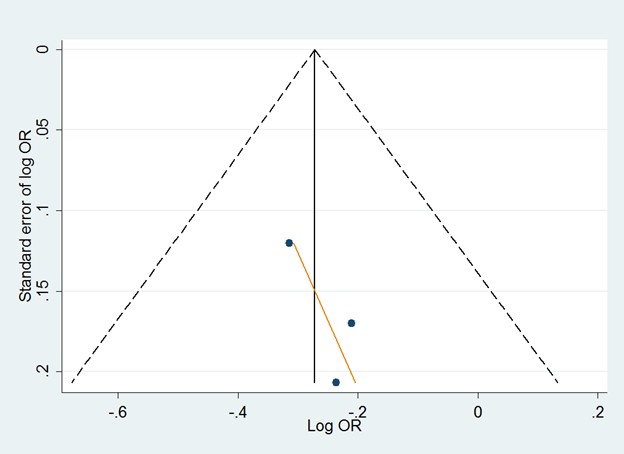
Polymorphism rs9939609
Moreover, there was not any association between the rs9939609 polymorphism and BC (OR 0.98 [0.79- 1.2]). There was not observable heterogeneity (I2: 23.1%, P=.27) and small study effect (b=-3.817, P=.303) in this analysis (Figure 3 and 4)(Figure 5).
Figure 3: Forest Plot of the Association between rs9939609 Polymorphism and Breast Cancer.
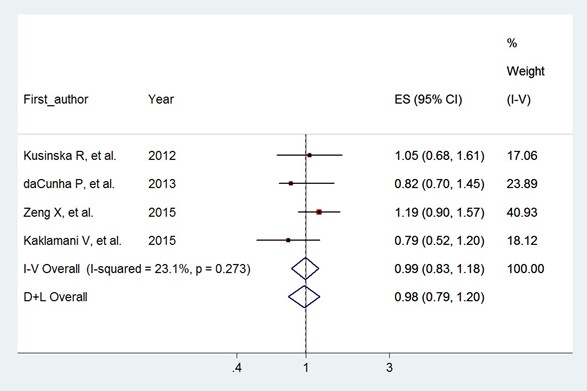
Figure 4: Funnel Plot of the Association between rs9939609 Polymorphism and Breast Cancer.
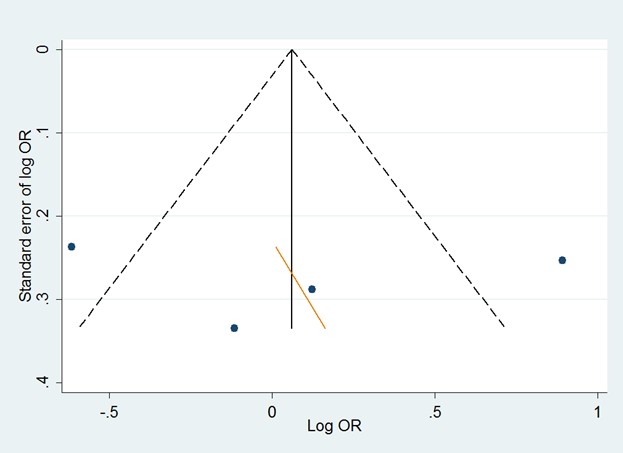
Figure 5: The Search Flow Chart.
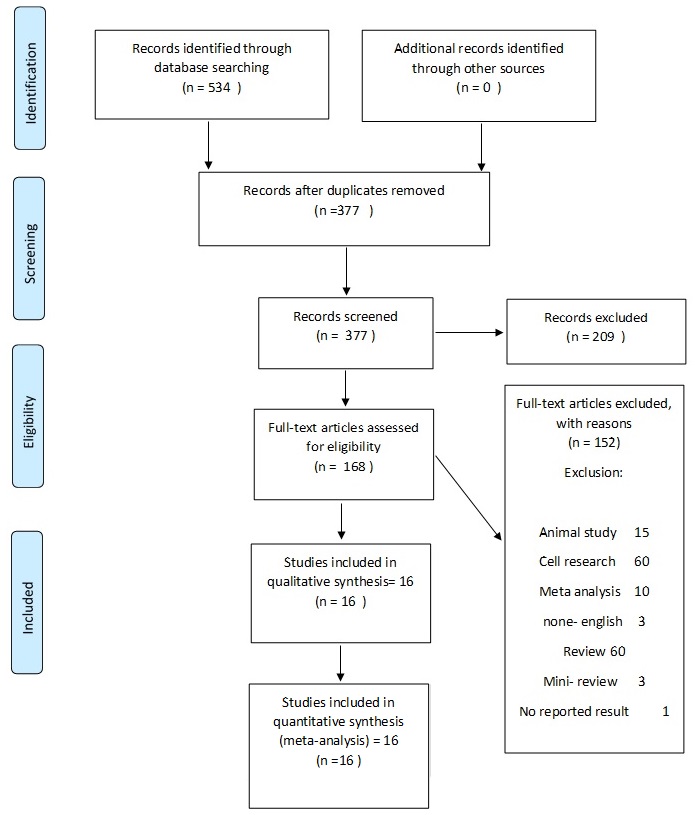
Discussion
FTO gene was for the first time identified in animal models as a gene affecting programmed cell death. Mice harboring mutations in this gene have fused toes and larger thymus than most other mice [9-10]. FTO gene encodes a 2-oxoglutaratedependent oxigenase that plays a role in DNA demethylation. This gene is located on human chromosome 16q12.2. Duplication of this gene region leads to mental retardation, obesity and other abnormalities [11]. FTO gene is expressed in all body tissues; however, its highest expression has been in the brain and hypothalamus [12].
Two years after the publication of the article on the association between genetic differences of FTO gene and obesity, the researchers began their research on the association between genotype differences in this gene and the risk of cancer in obese people of different races [13]. Quantitative studies have been conducted on the association between FTO gene variants and breast cancer and various results have been obtained from these studies. The reason for part of these differences may be due to the racial differences in the study groups. For example, in a study conducted on Iranian women, Mojaver et al. concluded that there is no significant association between rs9939609 and rs1477196 polymorphisms and the risk of breast cancer [14], but in other studies, a significant association was observed between the four FTO polymorphisms (rs7206790, rs8047395, rs9939609, and rs1477196) and the risk of breast cancer [15]. In a meta-analysis conducted on the association between FTO gene rs9939609 polymorphism and breast cancer, it was found that rs9939609 polymorphism in FTO gene is associated with the risk of breast cancer in Asian race [16].
Additionally, a case-control study conducted on different races showed that the risk of breast cancer for rs1477196 polymorphism in people with homozygous dominant alleles (AA) is 2.38 times higher than individuals with genotypes GG [15]. This is while, no association was observed between this polymorphism and the risk of cancer in other studies conducted on a particular race [15-17]. The major cause of these differences may be due to racial differences in different individuals. The frequency of FTO gene polymorphisms is very different in different races. For example, the frequency of rs9930506 polymorphism in Chinese individuals was reported to be less than 0.1 [18], while the frequency of this polymorphism is approximately 0.4 in white societies.
In addition, cultural and environmental factors may also affect the role of race in the association between FTO gene and breast cancer. For example, the rate of FTO gene expression is associated with breast cancer, and recent studies have shown that dietary composition also affects the rate of FTO gene expression [3]. Differences in dietary intake in different races may justify part of difference in the results reported in previous studies on the association between FTO gene and breast cancer.
In conclusion, generally, the results of studies in this field showed that there is an association between FTO gene, obesity and breast cancer. There have been very few studies conducted in this regard. More human studies are required to assess the interface between existing mechanisms of the effects of these genes on breast cancer.
Acknowledgments
This study was funded by the National Institute of Medical Research Development (Elite Grant # 977508), Tehran, Islamic Republic of Iran.
References
- Association between FTO gene polymorphism and cancer risk: evidence from 16,277 cases and 31,153 controls Li Guiqiong, Chen Qingwei, Wang Li, Ke Dazhi, Yuan Zhongming. Tumor Biology.2012;33(4). CrossRef
- Overweight, Obesity, and Mortality from Cancer in a Prospectively Studied Cohort of U.S. Adults Calle Eugenia E., Rodriguez Carmen, Walker-Thurmond Kimberly, Thun Michael J.. New England Journal of Medicine.2003;348(17). CrossRef
- Macronutrients and the FTO gene expression in hypothalamus; a systematic review of experimental studies Doaei Saeid, Kalantari Naser, Mohammadi Nastaran Keshavarz, Tabesh Ghasem Azizi, Gholamalizadeh Maryam. Indian Heart Journal.2017;69(2). CrossRef
- The bigger picture of FTO—the first GWAS-identified obesity gene Loos Ruth J. F., Yeo Giles S. H.. Nature Reviews Endocrinology.2013;10(1). CrossRef
- Single nucleotide polymorphisms of the FTO gene and cancer risk: an overview Hernández-Caballero Marta Elena, Sierra-Ramírez José Alfredo. Molecular Biology Reports.2014;42(3). CrossRef
- The Fat-Mass and Obesity-Associated (FTO) gene, physical activity, and risk of incident cardiovascular events in white women Ahmad Tariq, Chasman Daniel I., Mora Samia, Paré Guillaume, Cook Nancy R., Buring Julie E., Ridker Paul M., Lee I-Min. American Heart Journal.2010;160(6). CrossRef
- Cochrane Effective Practice and Organisation of Care. 2017.Suggested risk of bias criteria for EPOC reviews. http://epoc.cochrane.org/. Accessed 20 Apr .
- Preferred Reporting Items for Systematic Reviews and Meta-Analyses: The PRISMA Statement Moher David, Liberati Alessandro, Tetzlaff Jennifer, Altman Douglas G.. PLoS Medicine.2009;6(7). CrossRef
- The Fused Toes Locus Is Essential for Somatic-Germ Cell Interactions That Foster Germ Cell Maturation in Developing Gonads in Mice1 Kim Bongki, Kim Youngha, Cooke Paul S., Rüther Ulrich, Jorgensen Joan S.. Biology of Reproduction.2011;84(5). CrossRef
- N6-Methyladenosine in nuclear RNA is a major substrate of the obesity-associated FTO Jia Guifang, Fu Ye, Zhao Xu, Dai Qing, Zheng Guanqun, Yang Ying, Yi Chengqi, Lindahl Tomas, Pan Tao, Yang Yun-Gui, He Chuan. Nature Chemical Biology.2011;7(12). CrossRef
- Common Variation in the FTO Gene Alters Diabetes-Related Metabolic Traits to the Extent Expected Given Its Effect on BMI Freathy R. M., Timpson N. J., Lawlor D. A., Pouta A., Ben-Shlomo Y., Ruokonen A., Ebrahim S., Shields B., Zeggini E., Weedon M. N., Lindgren C. M., Lango H., Melzer D., Ferrucci L., Paolisso G., Neville M. J., Karpe F., Palmer C. N.A., Morris A. D., Elliott P., Jarvelin M.-R., Davey Smith G., McCarthy M. I., Hattersley A. T., Frayling T. M.. Diabetes.2008;57(5). CrossRef
- A Common Variant in the FTO Gene Is Associated with Body Mass Index and Predisposes to Childhood and Adult Obesity Frayling T. M., Timpson N. J., Weedon M. N., Zeggini E., Freathy R. M., Lindgren C. M., Perry J. R. B., Elliott K. S., Lango H., Rayner N. W., Shields B., Harries L. W., Barrett J. C., Ellard S., Groves C. J., Knight B., Patch A.-M., Ness A. R., Ebrahim S., Lawlor D. A., Ring S. M., Ben-Shlomo Y., Jarvelin M.-R., Sovio U., Bennett A. J., Melzer D., Ferrucci L., Loos R. J. F., Barroso I., Wareham N. J., Karpe F., Owen K. R., Cardon L. R., Walker M., Hitman G. A., Palmer C. N. A., Doney A. S. F., Morris A. D., Smith G. D., Hattersley A. T., McCarthy M. I.. Science.2007;316(5826). CrossRef
- Obesity and cancer: Mendelian randomization approach utilizing the FTO genotype Brennan P., McKay J., Moore L., Zaridze D., Mukeria A., Szeszenia-Dabrowska N., Lissowska J., Rudnai P., Fabianova E., Mates D., Bencko V., Foretova L., Janout V., Chow W.-H., Rothman N., Chabrier A., Gaborieau V., Timpson N., Hung R. J, Smith G. D.. International Journal of Epidemiology.2009;38(4). CrossRef
- Specific TaqMan allelic discrimination assay for rs1477196 and rs9939609 single nucleotide polymorphisms of FTO gene demonstrated that there is no association between these SNPs and risk of breast cancer in Iranian women Salehi Mansoor, Mojaver Mahboobeh, Mokarian Fariborz, Kazemi Mohammad. Advanced Biomedical Research.2015;4(1). CrossRef
- The role of the fat mass and obesity associated gene (FTO) in breast cancer risk Kaklamani Virginia, Yi Nengjun, Sadim Maureen, Siziopikou Kalliopi, Zhang Kui, Xu Yanfei, Tofilon Sarah, Agarwal Surbhi, Pasche Boris, Mantzoros Christos. BMC Medical Genetics.2011;12(1). CrossRef
- Association between FTO gene polymorphism (rs9939609 T/A) and cancer risk: a meta-analysis Huang Xiaoyi, Zhao Jian, Yang Mingyuan, Li Ming, Zheng Jianming. European Journal of Cancer Care.2016;26(5). CrossRef
- Genetic profile and determinants of homocysteine levels in Kazakhstan patients with breast cancer Akilzhanova A, Nurkina Z, Momynaliev K, Ramanculov E, Zhumadilov Z, Rakhypbekov T, et al . Anticancer research.2013;33(9):4049-4059.
- Association of FTO Mutations with Risk and Survival of Breast Cancer in a Chinese Population Zeng Xianxu, Ban Zhenying, Cao Jing, Zhang Wei, Chu Tianjiao, Lei Dongmei, Du Yanmin. Disease Markers.2015;2015. CrossRef
License

This work is licensed under a Creative Commons Attribution-NonCommercial 4.0 International License.
Copyright
© Asian Pacific Journal of Cancer Biology , 2020
Author Details